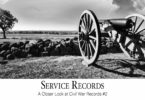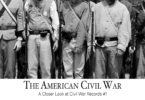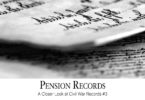One of the most personal types of Civil War records that survives today is the Civil War diary and/or letter. While most of these are not included in official government record collections (though there are exceptions, especially when letters and diary pages were used to support pension claims), there are, nonetheless, a lot of them out there. They are located in published collections, private collections, local and state archives and libraries, university collections, online genealogy and Civil War websites, and in private homes where they may not have left the hands of the family since the Civil War days.
Because soldiers and their families were often far apart from each other for months or years at a time during the Civil War, letters were frequently exchanged. The largest number of surviving letters are probably between husbands and wives, or between engaged couples, but you will find them between every kind of relative, and between friends, and even business associates. The more personal the relationship, the more personal the information included in the letter, and the more valuable it is to a genealogist.
If you are lucky, you might find a collection of letters exchanged back and forth between the same two people over a period of time during the war, which tells a complete and unique story of one person or couple’s Civil War experience. The wonderful thing about these letters, besides the personal sentiments and feelings they convey, is that they give a picture not only of what was happening with the soldier but of what was going on with their loved ones on the home front during the war, too.
The keeping of diaries was a popular pastime in the 1700s and 1800s, especially in the mid to late 1800s, which means there are a lot of Civil War diaries out there. You will find them written by both soldiers and by those who were at home during the war. These diaries may simply be accounts of the weather or other mundane things that went on during the war, or they may be quite detailed, with accounts of events, activities, and even personal feelings. Many of these diaries are published, but you can still find private ones in archives. Even if you can’t find a diary written by your ancestor, you can still glean a lot of what your ancestor’s Civil War life was like if you can find a diary written by someone who was from their regiment, or who lived near them, possibly even in the same community.
Finally, there are pictures. Most Civil War soldiers had their photographs taken either before going off to war or shortly after mustering into their regiment. The era of personal photographs becoming more affordable to the average person was happening right about now, so leaving a photograph with a loved one, or exchanging photographs in the mail between soldiers and loved ones was common at this period in history. If you look at regimental histories, old photo albums from your own family or local archives, or even in old newspaper records, you may find these photos, and some of them may be of your ancestors. These are always wonderful additions to a family tree, as putting a face to a name is invaluable.




